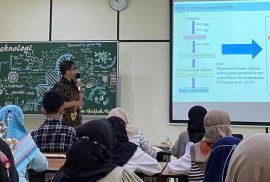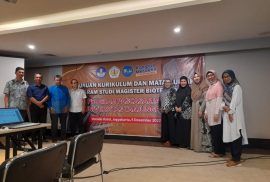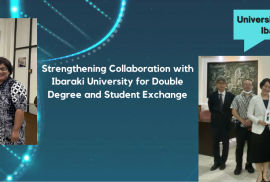The Study Program of Biotechnology, Graduate School of Universitas Gadjah Mada held a public lecture on Friday, December, 9th, 2022 with Mr. Agung Dian Kharisma, S.Pd.Si., M. Biotech., Ph.D. who is the Manager of PT. Widya Teknologi Hayati. PT Widya Teknologi Hayati is a biotechnology research company focusing on exploring and producing bioactive compounds. The material presented in this public lecture is related to the induction of resistance in plants by heat shock treatment. Every plant already has an innate immune system, but sometimes it is not strong enough to fight pathogens. The alternative method of heat shock is one way to improve this.
December
The Biotechnology Master Program of the Graduate School of Universitas Gadjah Mada and the Tanjungpura University Postgraduate Program held an event carried the theme “Curriculum and Course Overview of the Biotechnology Masters Program” on Monday, December 5th, 2022 at the Innside Hotel Yogyakarta. The team of speakers from the Master’s Program in Biotechnology UGM, namely Ir. Donny Widianto, Ph.D., Dr. Rarastoeti Pratiwi, M.Sc., and Dr. Tri Rini Nuringtyas, S.Si., M.Sc.
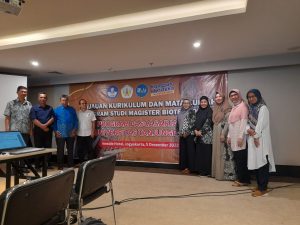
Representative persons from the Biotechnology Master Program of the Graduate School of Universitas Gadjah Mada explained curriculum evaluations and shared the experiences in implementing the Biotechnology Master’s Program as Tanjungpura University plans to hold a multidisciplinary Biotechnology Master’s Program.
Monday, December 5th, 2022 – The Biotechnology Study Program held a meeting with international partners from Ibaraki University, represented by Prof. Tatsuo Sato, PhD, Dr. Kikuchi Ashina, and Assoc. Prof. Sakagami Nobuo Ph.D.
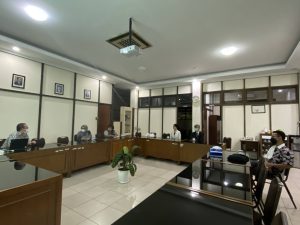
On that occasion, a discussion was held on the continuation of the Double Degree (DD) collaboration program for Master of Biotechnology students of Universitas Gadjah Mada who had been hampered by the COVID-19 pandemic. Furthermore, the Ibaraki University delegation also submitted a new program proposal in the form of a non-degree student exchange for Master of Biotechnology students. In this student exchange program, students have the opportunity to carry out research for 2-5 months at Ibaraki University. Students completing the program will receive a certificate signed by the Deans of both parties (Ibaraki University and Gadjah Mada University) in addition to joint publication opportunities. The activity closed with a discussion on the possibility of joint research collaboration and the exchange of souvenirs.
Study Program of Biotechnology, Graduate School of Universitas Gadjah Mada, had the opportunity to have a guest lecture with the speaker Dr. Yustian Rovi Alfiansah, on November 2022. The lecture was held online via Zoom application as Dr. Yustian Rovi Alfiansah is currently in Germany for a post-doctoral program at the Alfred Wegener Institute. In addition, he also serves as a researcher at the Research Center for Applied Microbiology, the National Research and Innovation Agency (BRIN). Dr. Yustian Rovi Alfiansah explained to all students who participated in the lecture that the specialization provided by the university provides great opportunities for future careers. These specializations are in the fields of health, agriculture, industry, and the environment.
On November 2022, the Study Program of Biotechnology, The Graduate School of Universitas Gadjah Mada held a Career in Biotechnology course with the guest lecturer Professor Teruna J. Siahaan, an honorary Professor and Associate Director of Department of Pharmaceutical Chemistry of the Kansas University (KU). At this opportunity, Prof. Teruna J. Siahaan explained the development of biotechnology, especially in the field of therapeutics. He also shared his various experiences and advice for the students who took part in the course.

